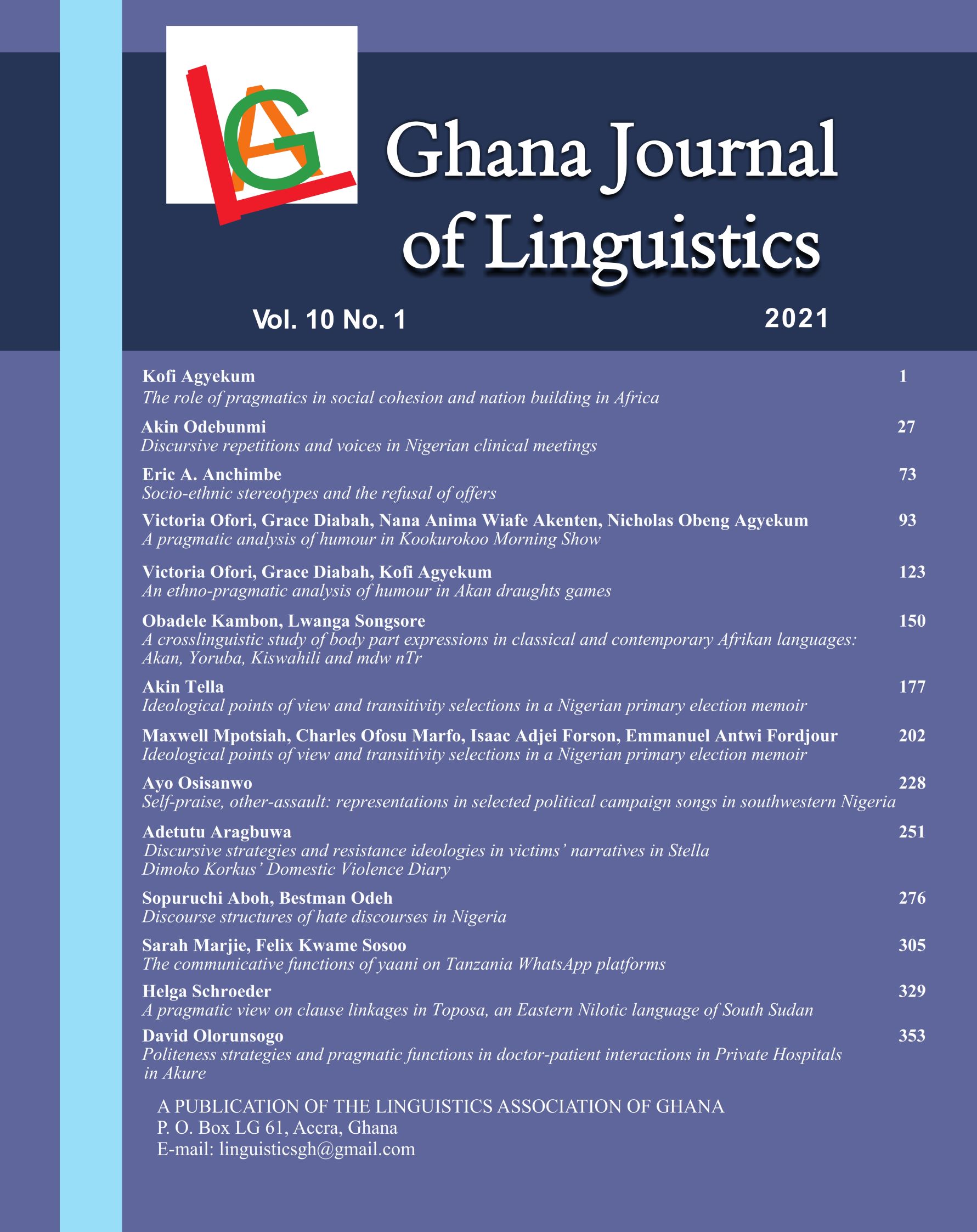A Cross-linguistic Study of Body Part Expressions in Classical and Contemporary Afrikan Languages
Akan, Yorùbá, Kiswahili and mdw nTr
DOI:
https://doi.org/10.4314/gjl.v10i1.334Keywords:
body part expressions, fundamental alienation, fundamental interrelation matrix, continuumAbstract
This study aims to discuss body part expressions in Akan (a Ghanaian language), Yorùbá (a Nigerian language), Kiswahili (a Tanzanian language) and r n Kmt ‘lit. the language of the Black Nation’. The paper addresses the common worldview whereby the concept and its articulation maintain a close connection to the literal real-world referent (the body part in question). The data is taken from collections of previously attested oral and written texts. The study demonstrates that there is a shared worldview continuum from ancient to contemporary Afrikan languages as manifested in body part expressions and that degree of proximity and similarity can be charted along a fundamental interrelation/fundamental alienation continuum.
References
Agyekum, Kofi. 2019. Akan Body Parts Expressions. Accra: Adwinsa Publications.
Allen, James P. 2013. The Ancient Egyptian Language: An Historical Study: Cambridge University Press.
Allen, James P. 2014. Middle Egyptian: An Introduction to the Language and Culture of Hieroglyphs. Cambridge: Cambridge University Press.
Ani, Marimba. 1994. Yurugu: An African Centred Critique of European Cultural Thought and Behavior. Trenton, NJ: Africa World Books.
Asumasɛm. 2017. "Ani Bɔne." YouTube/AdomTV. (https://www.youtube.com/watch?v=pCKMnLBOxyU).
Babalola, Adeboye. 1979. Akojopo Alo Ijapa Apa Keji [Collected Tales of Tortoise, Part Ii]. Ibadan: Oxford University Press.
Bahamadia. 1996. "3 Tha Hard Way." in Kollage. New York: Chrysalis/EMI Records.
Bondéelle, Olivier. 2011. "From Body to Emotion in Wolof: A Phraseology Process." Encoding emotions in African languages 17-34.
Boys, The. 1992. "I'm Yours." in The Saga Continues. Los Angeles: Motown.
Brindle, Jonathan, M. E. Kropp Dakubu and Obadele Kambon. 2015. "Kiliji, an Unrecorded Spiritual Language of Eastern Ghana." Journal of West African Languages 42(1): 65-88.
Carruthers, Jacob H. 1999. Intellectual Warfare. Chicago: Third World Press.
Christaller, Johann G. 1933. A Dictionary of the Asante and Fante Language Called Tshi (Twi). Basel: Basel Evangelical Missionary Society.
Dzahene-Quarshie, Josephine. 2016. "Inalienable Possession Constructions in Akan and Kiswahili." Kiswahili 79(1): 93-105.
Ethnologue. 2020a, "Yoruba: A Language of Nigeria", Web: Ethnologue.com. Retrieved 7 May 2020, 2020 (https://www.ethnologue.com/language/yor).
Ethnologue. 2020b, "Akan: A Language of Ghana", Web: Ethnologue.com. Retrieved 7 May 2020, 2020 (https://www.ethnologue.com/language/aka).
Ethnologue. 2020c, "Swahili: A Language of Tanzania", Web: Ethnologue.com. Retrieved 7 May 2020, 2020 (https://www.ethnologue.com/language/swh).
Fabunmi, Michael Ajayi. 1985. Yoruba Idioms. Ìbàdàn: African Universities Press.
Fashagba, Joseph Ajayi. 1991. "The First Illustrated Yoruba Dictionary." Toronto: J.A. Fashagba.
Gyekye, Kwame. 1987. An Essay on African Philosophical Thought - the Akan Conceptual Scheme. Cambridge: Cambridge University Press.
Harper, Douglas. 2020a, "Fear", Web. Retrieved 7 May 2020, 2020 (https://www.etymonline.com/word/fear).
Harper, Douglas. 2020b, "Disgust", Web. Retrieved 7 May 2020, 2020 (https://www.etymonline.com/word/disgust).
Harper, Douglas. 2020c, "Sadness", Web. Retrieved 7 May 2020, 2020 (https://www.etymonline.com/word/sadness).
Harper, Douglas. 2020d, "Surprise", Web: Etymonline. Retrieved 7 May 2020, 2020 (https://www.etymonline.com/word/surprise).
Harper, Douglas. 2020e, "Happy", Web: Etymonline. Retrieved 7 May 2020, 2020 (https://www.etymonline.com/word/happy).
Harper, Douglas. 2020f, "Anger", Web: Etymonline. Retrieved 7 May 2020, 2020 (https://www.etymonline.com/word/anger).
Harper, Douglas. 2020g, "Trust", Web: Etymonline. Retrieved 7 May 2020, 2020 (https://www.etymonline.com/word/trust).
Harper, Douglas. 2020h, "Joy", Web: Etymonline. Retrieved 7 May 2020, 2020 (https://www.etymonline.com/word/joy).
Hutcheson, Neal and Danica Cullinan [Director]. Year. Talking Black in America. (https://smackslide.com/slide/this-is-your-presentation-title-talking-black-in-america-wpgtz2).
Kambon, Ọbádélé Bakari, and Reginald Akuoko Duah. 2017. "Non-African Linguists Be Like,“This Is a New Way to Quote!”." Ghana Journal of Linguistics 6(2): 85-115.
Kambon, Ọ. 2017. "Akan Ananse Stories, YorùBá ÌJàPá Tales, and the Dikenga Theory: Worldview and Structure." Contemporary Journal of African Studies 4(2): 1-36.
Kambon, Ọ and Josephine Dzahene-Quarshie. 2017. "Twiswahili or Kiswatwili: A Study of Parallel Proverbs in Akan (Twi) and Kiswahili." Ghana Journal of Linguistics - Special Issue 6(2): 116-53.
Kambon, Ọ. 2019. "Ku Nseke and Ku MpèMba: The DikèNga Theory as Evinced through Content and Function of Akan Ananse Stories and YorùBá ÌJàPá Tales." Contemporary Journal of African Studies 6(2): 215-42.
Kambon, Ọ. and Yaw Mankatah Asare. 2019. "Humanities and Sciences as Complementary Aspects of an Afrikan=Black Whole: Evidence from Archeoastronomy." Legon Journal of the Humanities 30(2): 215-42.
Mackenzie, Bill. 2013, "Selected Kiswahili Idioms / Sayings", Web: AngelFire. Retrieved 22 October 2019, 2019 (http://www.angelfire.com/yt/chibilamsane/REVISED_SELECTED__KISWAHILI__I_D_I_O_M_S_aUG._2013.htm).
Mitchell, Larkin. 1999. "Earliest Egyptian Glyphs." Archaeology 52(2).
Niangoran-Bouah, Georges. 1984. The Akan World of Gold Weights: Abstract Design Weights. Abdijan, lvory Coast: Les Nouvelles Editions Africaines.
Obenga, Theophile. 1993. Origine Commune De L'egyptien Ancien, Du Copte Et Des Langues Negro-Africaines Modernes. Paris: L'Harmattan.
Ofori-Ansa, Kwaku. 1997. "Weights of Wisdom: History, Uses and Symbolism of Akan Goldweights." Hyattsville, MD: Sankɔfa Edu-Cultural Publications.
Osam, E. Kweku. 1994. "Aspects of Akan Grammar: A Functional Perspective." Ph.D. Thesis, Linguistics, University of Oregon, Eugene.
Patton, Michael Q. 2002. Qualitative Research & Evaluation Methods: SAGE Publications.
Scheven, Albert. 2012, "Swahili Proverbs: Methali Za Kiswahili", Web: Center for African Studies, University of Illinois at Urbana-Champaign. Retrieved 12 November 2019, 2019 (http://swahiliproverbs.afrst.illinois.edu/love.html).
Scientifik. 1994. "Lawtown." in Criminal. New York: Definite.
Vygus, Mark. 2015. "Middle Egyptian Dictionary." Web: Pyramid Texts Online. Retrieved.
YFAP. 2018, "Àjà Ló L'ẹ́Rù", Web: yorubaforacademicpurpose.blogspot.com. Retrieved 7 May 2020, (http://yorubaforacademicpurpose.blogspot.com/2018/05/aja-lo-leru.html).

Downloads
Published
How to Cite
Issue
Section
License
Copyright (c) 2021 Ọbádélé Bakari Kambon; Lwanga Songsore

This work is licensed under a Creative Commons Attribution 4.0 International License.
The Ghana Journal of Linguistics is published by the Linguistics Association of Ghana, P. O. Box LG 61, Legon, Accra, Ghana.
LAG Email: linguisticsgh@gmail.com. Website: http://www.laghana.org
GJL Email: gjl@laghana.org Website: http://www.laghana.org/gjl
© Linguistics Association of Ghana and individual authors, 2023.
